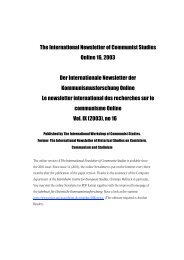VOL. XVI (2010), NO 23 - The International Newsletter of Communist ...
VOL. XVI (2010), NO 23 - The International Newsletter of Communist ...
VOL. XVI (2010), NO 23 - The International Newsletter of Communist ...
Erfolgreiche ePaper selbst erstellen
Machen Sie aus Ihren PDF Publikationen ein blätterbares Flipbook mit unserer einzigartigen Google optimierten e-Paper Software.
<strong>The</strong> <strong>International</strong> <strong>Newsletter</strong> <strong>of</strong> <strong>Communist</strong> Studies Online <strong>XVI</strong> (<strong>2010</strong>), no. <strong>23</strong> 80<br />
consul general. 2 During the same month, the leadership <strong>of</strong> the Comintern and the People’s<br />
Commissariat for Foreign Affairs established contact with the Mexican honorary consulate in<br />
Moscow in order to receive the documents for Borodin’s trip to the Western Hemisphere. 3<br />
<strong>The</strong> joint plan <strong>of</strong> the Comintern and the People’s Commissariat for Foreign Affairs was<br />
carried out neglecting “skepticism from the Bureau <strong>of</strong> the [Third] <strong>International</strong>”. It was an<br />
attempt to exploit American-Mexican contradictions and to use the existence <strong>of</strong> non-broken<br />
(but only suspended) <strong>of</strong>ficial relations between Mexico and the Bolshevik government. 4<br />
“Studying local conditions” was actually the main task <strong>of</strong> the Soviet emissary even if he could<br />
become the ambassador in Mexico, and that was just Aesopian language: studying <strong>of</strong><br />
conditions ment financing and coordination <strong>of</strong> the <strong>Communist</strong> movement in Latin America,<br />
with Mexico as its centre.<br />
Even though the mission appeared to be well organized and prepared as measured by the<br />
conditions <strong>of</strong> 1919, it initially suffered obvious defects. Emissaries <strong>of</strong> the 3 rd <strong>International</strong> who<br />
were sent to European countries in order to establish contacts with leaders <strong>of</strong> the socialist<br />
parties’ left fractions were quite <strong>of</strong>ten familiar with them from the Zimmerwald movement and<br />
were well informed <strong>of</strong> the complicated interrelations between various currents <strong>of</strong> the workingclass<br />
movement, as well as <strong>of</strong> the political situation in the countries <strong>of</strong> their destination.<br />
Borodin, however, was sent to Latin America with knowledge not exceeding that <strong>of</strong> any US<br />
citizen interested in political affairs (and the Moscow emissary had lived in the USA for<br />
eleven years). <strong>The</strong> Bolsheviks had no contacts in Mexico and there had never been any<br />
indirect communication through the American Socialist Party. Borodin didn’t speak Spanish<br />
and, consequently, could not work on his own.<br />
Nevertheless, Borodin's energy and his organizing experience allowed him to reach the<br />
impossible. Having arrived in Mexico and having found out the presence <strong>of</strong> English-speaking<br />
socialists <strong>of</strong> American origin, namely Charles Phillips and Irwin Granich, 5 he established,<br />
with their help, contacts with one <strong>of</strong> the small local Socialist Party’s leaders – the Indian<br />
Manabendra Nath Roy. Borodin effectively convinced his interlocutors and quickly enough<br />
achieved the goal to transform the Mexican Socialist party into a <strong>Communist</strong> one and to<br />
affiliate with the 3 rd <strong>International</strong> (on November, 24th, 1919). <strong>The</strong> Partido Comunista<br />
Mexicano was not numerous (only a dozen people), and only in 1920 the first party cells<br />
outside <strong>of</strong> Mexico City were created – in Veracruz, Orizaba, Tampico, Guanajuato,<br />
Zacatecas and Sonora – which were practically isolated and had no relations between<br />
eachother. However, Borodin was satisfied with the fact <strong>of</strong> a prompt birth <strong>of</strong> the <strong>Communist</strong><br />
Party.<br />
Certainly, the foundation <strong>of</strong> the PCM was not an exclusive result <strong>of</strong> the Comintern emissary's<br />
efforts. In the early autumn <strong>of</strong> 1919 a radical wing within the Mexican left movement had<br />
2 Russian State Archive <strong>of</strong> Social and Political History (RGASPI), Moscow, fond 2, opis’ 1, delo 9324, listy 1-<br />
1oborot; Georgij N. Golikov (ed.): V. I. Lenin. Biograficheskaia khronika. VII. Mokva, Izdatel’stvo politicheskoi<br />
literatury, 1976, p. 16; Sovetsko-meksikanskie otnosheniia. 1917-1980. Sbornik dokumentov, Moskva,<br />
Mezhdunarodnye otnosheniia, 1981, pp. 9-10.<br />
3 State Archive <strong>of</strong> the Russian Federation (GARF), Moscow, fond 5881, opis 1, delo 170, listy 6-8, 10-11. According<br />
to the Comintern’s correspondence with the People’s Commissariat for Foreign Affairs, in 1919 Borodin received 50<br />
thousands roubles (in foreign currency) and jewels to the amount <strong>of</strong> about half a million roubles (RGASPI, 495/18/6,<br />
20; RGASPI, 2/2/220, 1-1ob).<br />
4 <strong>The</strong> ECCI secretary Angelica Balabanova wrote about it in her message to Lenin. For the details <strong>of</strong> Mexican-<br />
Soviet relations, see: Héctor Cárdenas: Las relaciones mexicano-soviéticas. Antecedentes y primeros contactos<br />
diplomáticos. 1789-1927, Tlatelolco, Secretaría de Relaciones Exteriores, 1974, p.40; Héctor Cárdenas: Historia de<br />
las relaciones diplomáticas entre México y Rusia, México, 1993, p. 148.<br />
5 Later Granich was known in the USA as the writer Michael Gold. See details in Jeifets/Jeifets/Huber, Op. cit., p.<br />
131.














